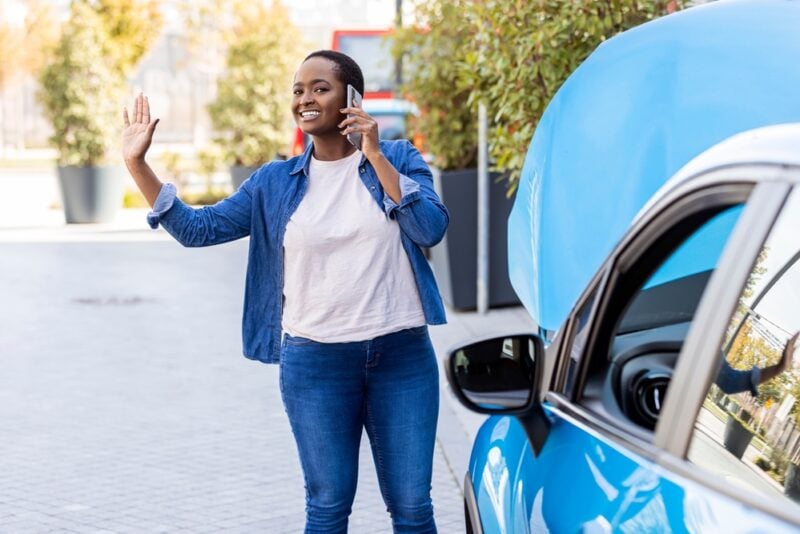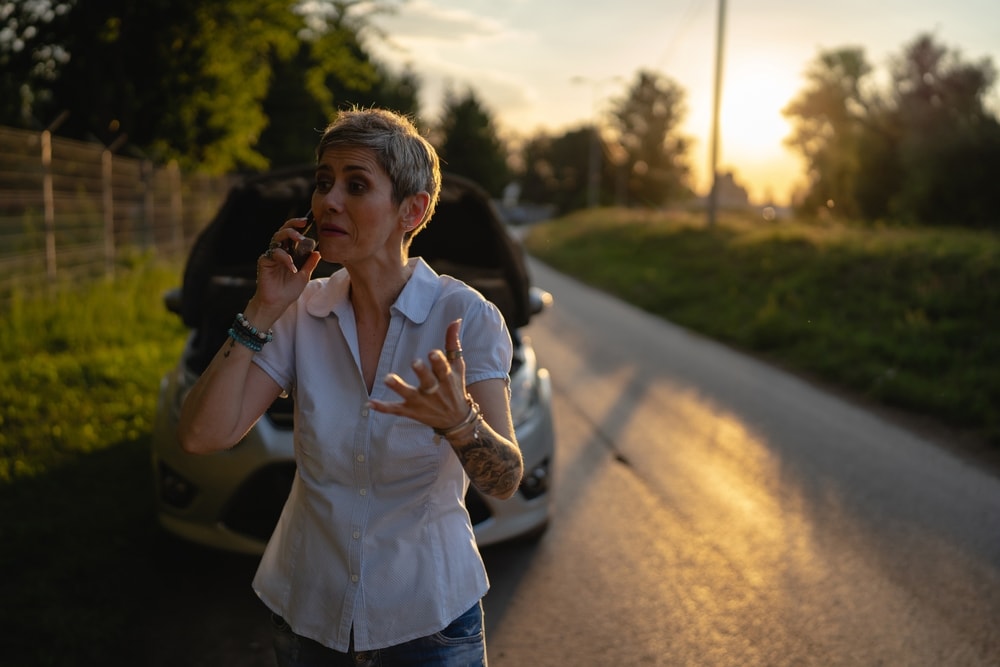7 Safety Do’s and Don’ts When Calling Roadside Assistance

There are plenty of situations where roadside assistance can come in handy. From the aftermath of an accident to a breakdown on the side of the road, the roadside assistance provided by your auto insurance could be a lifesaver. While this service can get you out of a jam, you must understand how to keep yourself safe when waiting for help to arrive.
The benefits of roadside assistance include many services, like towing, tire replacement, emergency fuel, and locksmithing. For many people, access to roadside assistance is the only thing preventing them from being stranded. However, you could put yourself at risk of injury while waiting for help to arrive. By following these 7 tips, you could ensure your experience is as seamless—and safe—as possible.
1. Stay Out of the Roadway
Whether you have a flat tire or a dead battery, your proximity to a busy road or highway puts you in constant danger. According to the Centers for Disease Control (CDC), more than 7,000 people are struck and killed by motor vehicles each year. Some individuals are in pedestrian accidents while waiting for roadside assistance after breaking down. There is also the risk that your vehicle could be struck by oncoming traffic if it is currently in the roadway. That means it is crucial to get off the road and stay away from traffic. The biggest threat to your safety when your vehicle breaks down is the presence of other moving vehicles.
2. Remain Where It Is Safest
Once you leave your vehicle, you should find a safe place to wait for roadside assistance to arrive. The farther away from moving vehicles you are, the more likely you are to avoid being struck by a car. If you are waiting by the side of the road, your best option is to remain out of the street and at least on a sidewalk. If there are nearby barriers, you could benefit from putting yourself behind them.
3. Check Your GPS
One of the things you will need to provide roadside assistance is your exact location. If you are in an area you are familiar with, that might not be difficult. The same is true if you break down in a parking lot or near a marked intersection. In other situations, however, it might be harder to pinpoint exactly where your vehicle is located. That is where GPS comes in.
Using a GPS device is a driving distraction, but it is also a useful tool when you are stuck on the side of the road. If you determine your GPS location, you can provide that information to roadside assistance. This can make it easier for them to find you and arrive at your location sooner. Providing roadside assistance with your exact GPS coordinates is generally more accurate than guessing at street names or mile markers.
4. Make Use of Your Roadside Emergency Kit
After you call roadside assistance, you might benefit from using a roadside emergency kit if you have one in your vehicle. If you have been injured, a first aid kit could be handy as you wait for help. If your vehicle is just off the roadway, flares or triangle reflectors could be useful to warn other drivers of your location. Even if your kit does not provide you with the tools to get you back on the road, it could have what you need to stay safe, warm, and comfortable while you wait for help to arrive.

5. Turn on Hazard Lights
The more visible your vehicle is, the less likely it is to be struck by a passing motorist. This generally involves turning on your hazard lights and leaving them activated, especially if you’re close to the road.
Hazard lights warn oncoming drivers that something is wrong. It gives them notice of changing road conditions, which could prevent them from colliding with your vehicle. This warning could be invaluable for helping you avoid additional expenses or injuries. One of the reasons you might need roadside assistance is that the amount of time you have to worry about hazard lights and visibility greatly diminishes when help arrives quickly.
6. Don’t Take Rides from Strangers
It is not unusual for passers-by to stop and offer help when it appears you have broken down by the side of the road or been involved in an accident. While offers of assistance are always nice, it is important to keep your personal safety in mind at all times. This extends to offers of a ride from strangers. What’s more, if you have roadside assistance it is best to rely on the help of those professionals instead of random individuals. Kindly let them know you have help on the way.
7. Don’t Leave Valuables in Your Vehicle
If you exit your vehicle and leave your car behind, do not leave valuables in your car. An abandoned car by the side of the road is a tempting target for some people. It is not uncommon to return to a vehicle that has broken down only to discover your valuables missing. Leaving valuables in your car not only puts your property at risk, but it increases the odds that your vehicle will be broken into. At the very least, hiding your valuables is better than leaving them visible for would-be thieves to discover.
Adding Roadside Assistance Can be a Lifesaver
Roadside assistance is typically an optional part of your car insurance. But for the money, it can be one of the most valuable when you really need help. In addition to providing people with great coverage at a reasonable price, we also offer roadside assistance as an additional – and affordable – option.
Bluefire Insurance offers affordable insurance. If you are interested in learning how we can help your car insurance customers, contact Bluefire Insurance at (866) 424-9511 or online to learn how we can help.
Related Articles
-
 August 7th 2023
August 7th 2023The Top 10 Biggest Issues Auto Insurance Agents are Facing Today
In the post-pandemic world, insurance agents face numerous new challenges, as well as some old ones. In[...]
-
 June 17th 2024
June 17th 2024The Evolution of Personal Lines Insurance: What Independent Agents Need to Know
Ever since the development of the internet, personal lines insurance agencies have undergone a tremendous amount of[...]
-
 June 3rd 2024
June 3rd 2024Tapping into Emerging Markets: The Role of Independent Agents in Today’s Insurance Industry Trends
Insurance industry trends have shifted dramatically in the past two decades. The average client has a level[...]
-
 May 21st 2024
May 21st 2024What Does It Take to Be an Insurance Agent Today in America’s Southeast
Becoming an insurance producer can be an exciting and rewarding career path. In this job, you can[...]
